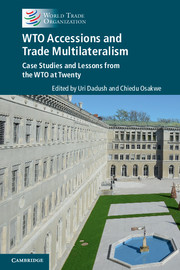Book contents
- Frontmatter
- Dedication
- Contents
- List of contributors
- Foreword
- Acknowledgements
- List of abbreviations
- Editors' note
- PART I WTO accessions, the trading system and the global economy
- PART II Overview: systemic outcomes from accessions
- PART III Members’ perspectives on accession negotiations
- PART IV Working party chairpersons’ perspectives on accession negotiations
- PART V Salient features inWTOAccession Protocols
- 29 Market access goods negotiations: salience, results and meaning
- 30 Services market opening: salience, results and meaning
- 31 WTO accession and the private sector: the nexus of rules and market opportunities
- 32 WTO accession and accession to the Agreement on Government Procurement: what is the relationship? Why should WTO acceding governments also consider GPA accession?
- 33 Energy-related rules in Accession Protocols: where are they?
- 34 Domestic framework for making and enforcing policies
- 35 Export duty commitments: the treaty dialogue and the pattern of commitments
- 36 Disciplining state trading practices: lessons from WTO accession negotiations
- 37 Intellectual property rights protection: the plus/minus debate from a least-developed country perspective – sense and nonsense
- 38 The future of multilateral investment rules in the WTO: contributions from WTO accession outcomes
- 39 Sanitary and phytosanitary measures: trends in accession plurilateral negotiations
- 40 Strengthening transparency in the multilateral trading system: the contribution of the WTO accession process
- PART VI Conclusion
- Annex: Contributor biographies
- Index
- Plate section
- References
29 - Market access goods negotiations: salience, results and meaning
from PART V - Salient features inWTOAccession Protocols
Published online by Cambridge University Press: 05 November 2015
- Frontmatter
- Dedication
- Contents
- List of contributors
- Foreword
- Acknowledgements
- List of abbreviations
- Editors' note
- PART I WTO accessions, the trading system and the global economy
- PART II Overview: systemic outcomes from accessions
- PART III Members’ perspectives on accession negotiations
- PART IV Working party chairpersons’ perspectives on accession negotiations
- PART V Salient features inWTOAccession Protocols
- 29 Market access goods negotiations: salience, results and meaning
- 30 Services market opening: salience, results and meaning
- 31 WTO accession and the private sector: the nexus of rules and market opportunities
- 32 WTO accession and accession to the Agreement on Government Procurement: what is the relationship? Why should WTO acceding governments also consider GPA accession?
- 33 Energy-related rules in Accession Protocols: where are they?
- 34 Domestic framework for making and enforcing policies
- 35 Export duty commitments: the treaty dialogue and the pattern of commitments
- 36 Disciplining state trading practices: lessons from WTO accession negotiations
- 37 Intellectual property rights protection: the plus/minus debate from a least-developed country perspective – sense and nonsense
- 38 The future of multilateral investment rules in the WTO: contributions from WTO accession outcomes
- 39 Sanitary and phytosanitary measures: trends in accession plurilateral negotiations
- 40 Strengthening transparency in the multilateral trading system: the contribution of the WTO accession process
- PART VI Conclusion
- Annex: Contributor biographies
- Index
- Plate section
- References
Summary
ABSTRACT
Trade negotiations and the exchange of concessions on trade in goods have been the cornerstone of the multilateral trading system. This chapter examines the salient features, results and meaning of the schedules of tariff concessions and commitments on goods of Article XII members: what they mean and what they have contributed. We find that the bilateral market access of Article XII members has shaped the landscape of tariff commitments that provide transparency and predictability to today's merchandise trade relationships. We also found that the large number of post-2001 accessions coincided with an extended period of global growth, particularly among the major emerging economies, fostered by the stability of trade regimes. When we compared Article XII members with General Agreement on Tariffs and Trade (GATT) members on bound tariffs, we found that the comparable bound tariff rates were higher for GATT members, and that a number of original members retained unbound tariff lines for non-agricultural products. Overall, results from the concluded accessions have produced more liberal tariff concessions than those of original WTO members, expanding the market access for WTO members' exports. The lower barriers to trade in these Article XII members' markets have improved economic efficiency, increased competition and led to better resource reallocation.
The negotiations and the exchange of concessions on trade in goods have been the cornerstone of the multilateral trading system. The schedules of concessions and commitments of the original contracting parties to the General Agreement on Tariffs and Trade (GATT), the subsequent rounds of negotiations and the bilateral market access negotiation of new WTO members have shaped the landscape of tariff commitments that provide transparency and predictability to today's merchandise trade relationships. It is interesting to note that the large number of post-2001 accessions coincided with an extended period of global growth, particularly among the major emerging economies, fostered by the stability of trade regimes.
This chapter highlights some of the salient features of the outcomes of the market access negotiation on goods of thirty-one of the members that joined the WTO after the Uruguay Round, pursuant to Article XII of the Marrakesh Agreement Establishing the WTO (the WTO Agreement) (Article XII members) and identifies the patterns and distinctive features which characterise these accessions. The specific focus is on Part I, Section I-A (agricultural products tariffs) and Section II (other products tariffs) of the schedules.
- Type
- Chapter
- Information
- WTO Accessions and Trade MultilateralismCase Studies and Lessons from the WTO at Twenty, pp. 623 - 640Publisher: Cambridge University PressPrint publication year: 2015



